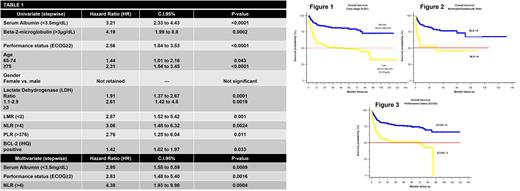Abstract
Background: Diffuse large B-cell lymphoma (DLBCL) is the most common non-Hodgkin lymphoma subtype. Early stage (I/II) disease is seen in up to 30% of all DLBCL cases, and although outcomes in this subgroup have been reported as optimal, relapses can still occur. Prognostic models such as the International Prognostic Index (Miller, NEJM, 1998) continues to be utilized for risk stratification in DLBCL. However, despite its limitations and lack of validation in specific demographic groups such as Latin American patients, no prognostic models exist for the evaluation of limited stage DLBCL. Therefore, we aim to investigate different clinico-epidemiological and laboratory variables and its impact on survival in early stage DLBCL.
Methods: We conducted a retrospective study of newly diagnosed patients with early stage DLBCL. Using the Grupo de Estudio Latinoamericano de Linfroproliferativos (GELL) database, we selected patients that had early stage disease, defined as non-bulky stage I or II. The variables analyzed included demographic and clinical variables (e.g., age, ECOG performance status), the International Prognostic Index (IPI), and laboratory variables such as serum albumin, serum lactate dehydrogenase (LDH), serum beta-2-microglobulin, the lymphocyte-monocyte ratio (LMR), the neutrophil-lymphocyte ratio (LNR), and the platelet-lymphocyte ratio (PLR). To determine the variables associated with mortality, univariate and multivariate Cox regression (step-wise type) analysis was performed. Kaplan-Meier and log-rank test were used for survival analysis. Outcomes with a p-value <0.05 were considered statistically significant.
Results: We identified 1,375 patients with DLBCL; 503 were identified as early stage DLBCL of whom 498 had sufficient data for analysis. Almost all cases (n=483, 96%) had nodal disease as the primary site, and 15 (4%) extranodal, all within the gastrointestinal tract. There was a slight female predominance (51.8%). The median age at diagnosis was 64 (IQR: 50 -73) with 57.4% older than >65 years. ECOG performance status of <2 was seen in 77.2% of cases; elevated serum LDH in 32.4%; and elevated serum beta-2-microglobulin in 5.6% (n=11/192). Based on previous data, we evaluated and calculated variables that have been suggested as independent negative prognostic factors for overall survival; the proportion of patients with serum albumin <3.5 mg/dL; LMR <2, NLR >4, and PLR >376 was 34.4%, 10.3%, 9.2%, and 4.7% respectively. With a median follow-up of 45 months, the median 5-year overall survival (OS) rate was 72%. The therapy approaches used, response rates and outcomes with these approaches will be presented at the meeting. Results of the univariate and multivariate analysis are summarized in Table 1. We found that age over 65, ECOG performance status, serum albumin level, beta-2-microglobulin level, LDH ratio, LMR, NLR, PLR, and BCL-2 positivity by immunohistochemistry (IHC) were prognostic factors for OS in the univariate analysis. However, in the multivariate analysis, only NLR, serum albumin level and ECOG performance status were independent factor for worse prognosis. Survival rates were significantly shorter in patients with serum albumin <3.5 g/dL (5-year OS of 49% versus 79%, respectively; p<0.0001); NLR >4 (5-year OS of 46% versus 73%, respectively: p=0.0013); and ECOG performance status ≥2 (5-year OS of 51% versus 74%, respectively; p<0.0001) (Figures 1 to 3).
Conclusion: In this large cohort of Latin American patients with early stage DLBCL most patients were older than 65, had nodal disease as the primary site, good performance status, with only a third of patients exhibiting elevated LDH. Moreover, we found serum albumin <3.5 g/dL, NLR >4 and ECOG ≥2 as negative prognostic factors for poor survival in early stage DLBCL. We are currently validating our findings in a prospective cohort of Latin American DLBCL patients and to improve clinical decision-making in those deemed at high-risk for early mortality.
Otero: Astra Zeneca: Current Employment. Oliver: Roche: Other: conference support and fees ; Abbvie: Other: conference support and fees . Castillo: Abbvie: Consultancy, Research Funding; BeiGene: Consultancy, Research Funding; Pharmacyclics: Consultancy, Research Funding; Janssen: Consultancy; Roche: Consultancy; TG Therapeutics: Research Funding.


This feature is available to Subscribers Only
Sign In or Create an Account Close Modal